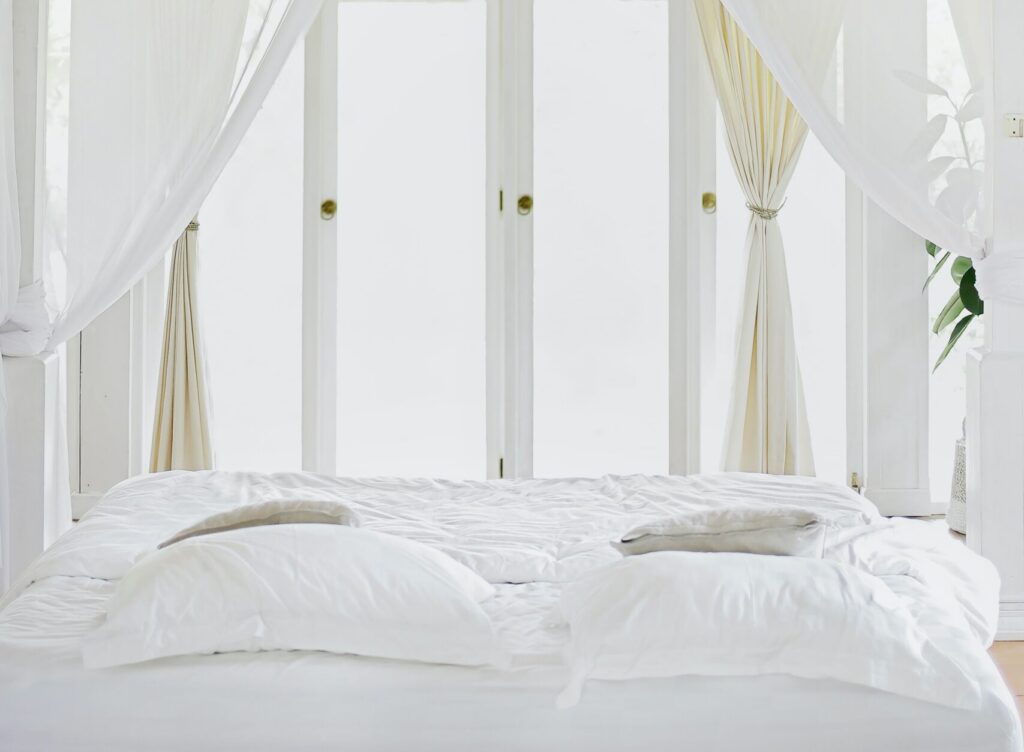A good night’s sleep is something people often take for granted, until they don’t have it.
Combining interior design and my expertise in Public Health and having worked in both sectors for more than 20 years, over that time I have learned the importance of sleep. Sleep enhances your memory, keeps you slim, and protects you from disease and dementia. Sleep is the foundation for good health, alongside diet and exercise.
“Each night, when I go to sleep, I die. And the next morning, when I wake up, I am reborn.” Mahatma Gandhi
A couple of years ago I read an interesting book written by Matthew Walker called Why we sleep. The book reiterated how important sleep is for our health, and how sleep is not simply the absence of wakefulness. Sleep is especially crucial for our brain and our memory. A study conducted by the American Academy of Sleep Medicine found that we should get at least seven hours of sleep per night.
However, getting seven hours of sleep a night is easier said than done. I’m sure we all want to sleep better and to get our seven hours in, but how do we actually make this happen?
How to help guests get better sleep ?
There are many discussions around sleep and what to do to improve the human necessity of sleep.
As an interior designer specialising in hospitality, I aim to create spaces that can enhance a good night’s sleep. I am thinking not only of the bed, but of the materials I use to be nontoxic, colours that are calming, lights that can adapt to our human circadian clock, air quality to be good, and temperature to be cool.
I also minimise the number of electronic gadgets in the room to reduce distraction. Blue light, which is emitted from smartphones, computers, and bright lights, may inhibit your sleep if you are exposed to it at night.
It all starts with a good bed
For guests to be able to get the best possible sleep, the bed is extremely important.
The mattress should actively conform to any individual body shape and movements, and it must support the spine in a natural relaxed position.
Longevity is an important aspect for the hospitality industry to consider when choosing beds. I choose to work with a Swedish company, DUXIANA, where the beds are produced and designed to last for generations.
Also be considerate when choosing the mattress materials. Certifications, like the Oeko-Tex Standard 100 seal, means the materials used meet the strict human-ecological requirements of being completely free of any unhealthy or harmful substances.

The power of napping
According to sleep expert Sara Mednick, 20-minute power naps can boost your alertness, and longer naps between 30-60 minutes can boost memory and creativity.
If we can design spaces that are flexible to accommodate a nap during the day as well as a good night’s sleep at night, this will enable our guests to maximize their stay and enhance their wellbeing.
Collaborate with the kitchen to help improve sleep
Sleep-friendly food and drink can be offered to guests as part of the room service menu to help them enjoy the replenishing hours of sleep.
Almonds contain high doses of melatonin, a hormone that helps regulate the sleeping and waking cycle. It contains two minerals, magnesium, and calcium, which help promote muscle relaxation and sleep.
The herb chamomile is a traditional remedy for insomnia, and a cup of chamomile tea with its flavonoid compound could have a sleep-inducing property.
There’s a reason why your grandmother may have put lavender on your pillow. Lavender is a plant that can be found on almost all continents and is known to have a soothing fragrance that is believed to improve the quality of sleep.
A good pillow
A good sleep posture is essential for sore and overworked muscles to relax and heal at night. Therefore, the importance of a great pillow can help improve sleep posture and maintain a comfortable position through the night.
Greens for the air and for our sight
The colour green is reminiscent of nature and can evoke a sense of calmness. We can bring green into the bedroom with real plants, which will also enhance the air quality, and through green colour and nature-inspired décor, which will assist with the inhabitant’s quality of sleep.
Hospitality design with sleep in mind
Sleep is an important part of a guest’s experience. If we can deliver environments and rooms where guests can truly relax, unwind and get a great night’s sleep, you can rest assured it will be a place they will want to return to time and time again.
“To sleep, perchance to dream, ay, there’s the rub.” William Shakespeare
Maria Tibblin is a Scandinavian Interior Designer based in London, UK, specialising in hospitality interior design. View Maria’s Design Concept to find out more.
